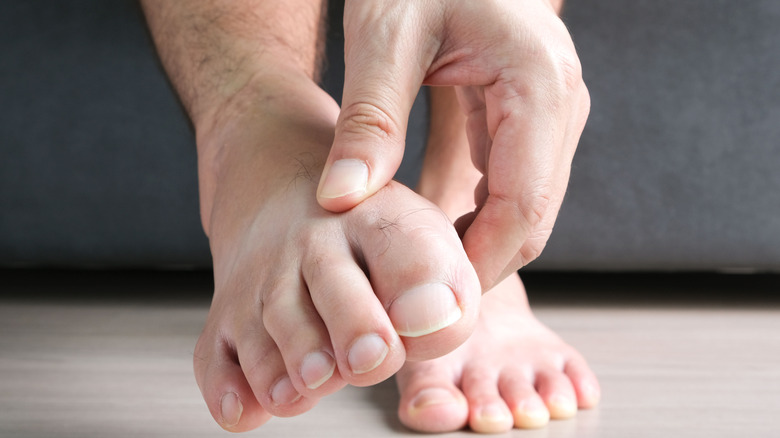Medications That May Actually Make You Lose Your Hair
Did you know that aside from the palms of our hands and the soles of our feet, hair can basically grow anywhere on the surface of our skin? According to InformedHealth.org, the reason behind this lies deep within the layers of our skin, where millions of hair bulbs can be found. These hair bulbs each have their own blood supply, allowing them to continually produce new cells. These new cells form and harden, and they eventually grow upwards towards the surface of the skin and become visible to us as hair.
Aside from serving as an aesthetic accessory to our overall outward appearance, our hair actually plays very important roles in our health. Per StatPearls, hair helps regulate body temperature through sweating, serves as sensory organs, and helps prevent foreign substances from entering your body (specifically for the hair in your nose and ears).
People experience hair loss for many reasons. But most of the time, the underlying cause is genetic, which means that we can't really do anything to prevent it. Other times, however, it can be because of imbalances in our hormones, certain medical conditions, stress, the food that we eat, or the medications we take (per Mayo Clinic).
All medications come with their own set of side effects. Not a single one is completely safe to take, and taking medications is all about weighing the benefits against the risks. Below are some drugs you may be taking that could potentially explain why you are losing your hair.
Hormone therapies
Hormones are tricky little things. They can affect virtually any process in our body, including the growth and loss of our hair. According to authors of a 2020 article published in the International Journal of Molecular Sciences, both male (i.e., testosterone, dihydrotestosterone) and female (i.e., estrogen, progesterone) hormones can alter how much hair we produce, and they can exert opposing effects on different parts of the body.
Specifically, male hormones are responsible for the increase in pubic and axillary hair production that all of us go through during puberty. However, they are also responsible for hair loss in the scalp area. On the other hand, female hormones indirectly affect hair growth and loss by exerting their effects on the synthesis and metabolism of male hormones. It is important to note, however, that both male and female hormones are present in both men and women. They are just referred to as such because male hormones are more abundant in men, and female hormones are more abundant in women.
Because hair growth is sensitive to hormones, hair changes are some of the common side effects seen in people undergoing hormone therapies. According to WebMD, hair loss can happen in people using contraceptives, particularly progestin implants, hormone injections, skin patches, and vaginal rings. In addition, Medical News Today states that male pattern baldness can occur in males undergoing testosterone replacement therapy.
Thyroid medications
The thyroid gland is a butterfly-shaped organ located in the front part of the neck, producing hormones that control many processes in the body. Diseases of the thyroid can cause hormone underproduction (hypothyroidism) or overproduction (hyperthyroidism), leading to several symptoms that can manifest virtually anywhere in the body (via MedlinePlus). Both conditions are associated with hair loss.
Per Medical News Today, the hair cycle is very sensitive to changes in hormone levels. Any disruption can cause stress in your body, forcing a big chunk of your hair follicles to enter the telogen phase (i.e., telogen effluvium). In addition, certain thyroid diseases are autoimmune in nature (e.g., Graves' disease, Hashimoto's thyroiditis), and having one autoimmune condition significantly increases your risk of developing another one. Alopecia areata is an example of an autoimmune condition that is characterized by well-demarcated, focal patches of hair loss in the scalp, face, and other areas with hair growth (per DermNet).
There are many treatment options for thyroid problems. For an underactive thyroid, thyroid hormone replacement (e.g., levothyroxine) is an option, while one of the treatments for an overactive thyroid involves medications that prevent the synthesis of thyroid hormones (e.g., methimazole, propylthiouracil). Using any of these medications can lead to hair loss in the same way thyroid disease does. This may be especially apparent at the beginning of treatment, when you and your healthcare provider try to find the right dose that will help normalize your thyroid hormone levels.
Chemotherapy agents
When people think of chemotherapy, they almost always associate it with an image of someone who has lost their hair. This is somewhat accurate, as some (not all) chemotherapy agents can cause hair loss (via MD Anderson Cancer Center). The National Cancer Institute states that the goal of chemotherapy is to cure or manage cancer by stopping or slowing down rapidly dividing cancer cells, and/or shrinking tumors that are causing problematic symptoms.
The American Cancer Society adds that unfortunately, chemotherapy can also affect other cells in the body that are already fast-growing in nature. These include blood cells, bone marrow cells, skin cells, hair follicles, and cells that line mucosal membranes (i.e., organs and other structures belonging to the digestive, reproductive, and urinary systems). Thus, people undergoing chemotherapy may develop a wide variety of side effects like anemia, fatigue, compromised immunity, easy bruising or bleeding, GI upset (e.g., nausea, vomiting, diarrhea, constipation, loss of appetite), mouth sores, dry skin, hair loss, nerve issues, urinary problems, low libido, infertility, brain fog, and mood swings.
According to Cancer.net, it usually takes a few weeks of chemotherapy for hair to start falling out. Although the type and dose of the drug can influence how much hair a person can lose, it may still vary from person to person. Chemotherapy agents that are more likely to cause hair loss or hair thinning include carboplatin, cisplatin, cyclophosphamide, paclitaxel, doxorubicin, idarubicin, gemcitabine, ifosfamide, and vincristine.
Medications that suppress the immune system
Your immune system is responsible for protecting you against foreign substances, but some people develop conditions wherein their immune system turns around and attacks their own healthy cells. These are called autoimmune conditions, and in these instances, the only way to treat them is to suppress the immune system.
Immunosuppressants consists of many classes of drugs, including corticosteroids (e.g., prednisone), biologics (e.g., Humira, Remicade, Herceptin), monoclonal antibodies (e.g., Keytruda, Dupixent, Ocrevus), calcineurin inhibitors, and JAK inhibitors. They are used to treat a wide range of autoimmune diseases such as lupus, psoriasis, and rheumatoid arthritis; they are also prescribed to people after they receive an organ, stem cell, or bone marrow transplant. Because the whole premise behind treatment with immunosuppressants is essentially to block your immune system, people taking these drugs are more prone to developing infections. Depending on the medication, other side effects that may occur include fatigue, weight gain, headaches, GI upset, high blood pressure, diabetes, osteoporosis, tremors, acne, and ironically, hair loss or hair growth (per Cleveland Clinic).
Immunosuppressants that have been associated with hair loss or hair thinning include tacrolimus, azathioprine, methotrexate, leflunomide, cyclophosphamide, and etanercept. Meanwhile, cyclosporine is associated with excess hair growth.
Vitamin A and vitamin A-derived medications
Vitamin A is a fat-soluble vitamin that supports the immune system, facilitates growth and differentiation of cells, ensures proper development and function of major organs, and is a crucial component in maintaining healthy vision (via the National Institute of Health). It can naturally be acquired through the food that we eat, such as organ meat, dairy, eggs, fish, green leafy vegetables, sweet potatoes, and carrots.
Although vitamins in general are essential to our health, consuming too much can cause problems as well. For vitamin A specifically, the recommended daily amount per the FDA is 900 micrograms of retinol activity equivalents (mcg RAE). To put things into perspective, one whole baked sweet potato has 1,403 mcg RAE, half a cup of spinach has 573 mcg RAE, and half a cup of carrots has 459 mcg RAE.
Inadequate vitamin A can lead to dry skin, eye problems (e.g., dry eyes, night blindness), delayed growth, infertility, an increased risk of infections, inadequate wound healing, and acne (per Healthline). On the other hand, too much vitamin A can also cause dry skin and eye problems (e.g., blurry vision), as well as headaches, dizziness, nausea, vomiting, bone pain, skin discoloration, rash, and hair loss (via Cleveland Clinic).
Retinoids are vitamin A derivatives that are most famous for their skin-clearing and anti-aging properties. Per GoodRx Health, oral retinoids (e.g., isotretinoin) have also been linked to telogen effluvium, especially when taken in higher doses.
Medications for gout
Gout is a painful inflammatory arthritis that often occurs in the big toe or lower extremities. It happens when there is too much uric acid in the body, causing needle-shaped crystals to form and deposit in and around the joints. Gout typically flares for a couple of weeks and then goes away on its own or with the help of medications. According to the National Institute of Arthritis and Musculoskeletal and Skin Diseases (NIAMS), genetics and environmental factors seem to play a role in the development of gout. However, your chances of developing gout can also significantly increase if you are older, have a family history of gout, are overweight or obese, have certain health conditions (e.g., high blood pressure, diabetes, psoriasis, cancer), drink alcohol, or eat purine-rich foods.
Treatment of gout typically involves medications and lifestyle changes. Common medications for gout include colchicine, allopurinol, and febuxostat. Colchicine helps relieve pain by reducing inflammation, while allopurinol and febuxostat target a specific enzyme involved in the production of uric acid (via Johns Hopkins Arthritis Center).
According to MedlinePlus, colchicine, allopurinol, and febuxostat can all be used to prevent gout attacks from happening, but only colchicine can help relieve pain from an acute attack. Common side effects of these drugs include drowsiness, nausea, and diarrhea, but they can also cause life-threatening allergic reactions. Rarely, these drugs can cause hair loss or thinning, among many other possible side effects.
Medications for Parkinson's disease
Parkinson's disease is a type of dementia that is associated with movement problems such as tremors, stiffness, imbalance, and a lack of coordination. Per the National Institute of Aging, over time, these symptoms can become worse and may be accompanied by urinary problems, constipation, fatigue, memory issues, changes in behavior, and depression. Unfortunately, there is no cure for Parkinson's disease, but there are several medications and other forms of therapy available to help delay its progression and/or manage its symptoms. Included in these medications are dopamine agonists to increase dopamine levels in the brain, enzyme inhibitors to prevent the breakdown of dopamine, anticholinergic drugs to help decrease tremors and stiffness, and amantadine to help control involuntary movements.
Among the medications used to treat Parkinson's disease, levodopa, carbidopa, and dopamine agonists have been linked to hair loss in some older studies. Additionally, authors of a 2013 study published in the British Journal of Dermatology observed that in vitro, dopamine is able to inhibit hair growth by promoting regression of hair follicles. Although more studies need to be done in order to further solidify the evidence, the authors inferred that medications that increase dopamine levels may potentially cause hair loss, while medications that inhibit dopamine may possibly help promote hair growth.
Medications used to treat infections
Microorganisms are present all around us. Some of them are beneficial for us, while others cause us harm. In the past, infections were considered fatal. But over the years, advancements in the field of medicine brought about the creation of countless medications to get rid of these infections, which consequently helped us live much longer.
Just like any other medication, however, antimicrobials are not without side effects. Antibiotics, antifungals, and antivirals can cause GI upset (e.g., nausea, vomiting, diarrhea) and trigger an allergic reaction in susceptible people. Other side effects also exist, but they largely depend on the specific type of medication. According to Healthline, antibiotics are indirectly associated with hair loss or thinning because of their tendency to cause anemia and vitamin B deficiency. As for antifungals and antivirals, voriconazole and acyclovir have been linked to hair loss, although it is still unclear how it happens.
Treatment with antimicrobials can be tricky, because only certain drugs are effective against certain infections. In addition to this, because microorganisms are very resilient creatures, some of them have evolved to become resistant to the drugs used to treat them. This is especially true for antibiotics. One of the reasons why this happens is due to inappropriate use of antibiotics, which includes not taking the drug as prescribed (per Cleveland Clinic). Therefore, if you are experiencing any side effects while taking antimicrobials, let your doctor know as soon as possible.
Nonsteroidal anti-inflammatory drugs
As stated by the U.S. Food & Drug Administration, nonsteroidal anti-inflammatory drugs (NSAIDs) are a group of prescription and over-the-counter medications used to reduce fever, and relieve pain that is associated with colds, the flu, headaches, and arthritis. Drugs under this class include ibuprofen (Advil, Motrin), naproxen (Aleve), celecoxib (Celebrex), and diclofenac (Cambia, Voltaren).
NSAIDs are some of the most commonly used medications out there. Most people are able to take them without any problems, but some may be more sensitive to them and prone to experiencing their associated side effects. Side effects and complications that have been linked to NSAID use include GI issues (e.g., stomach pain, heartburn, bloating, nausea, vomiting, diarrhea, constipation, bleeding, ulcers), dizziness, loss of coordination, difficulty concentrating, allergic reactions, an increase in blood pressure, kidney damage or failure, heart attack, stroke, and easy bruising or bleeding (via Healthline).
Hair loss is a rare side effect of NSAIDs, and not all NSAIDs are associated with hair loss. According to Medical News Today, naproxen and other NSAIDs are among the many medications that can cause telogen effluvium, a reversible form of hair loss wherein a large portion of the hair enters the telogen, or shedding, phase. Normally, only 5% to 10% of our hair is in this phase. In people with telogen effluvium, this number increases to up to 30%, making hair loss visibly apparent.
Antidepressants and related drugs
Antidepressants are not only used to manage depression; they are also prescribed to people with several other health conditions like anxiety, insomnia, chronic pain, migraines, obesity, and hot flashes. There are many groups under this class of drugs, each of them working differently from one another. For the most part, however, the main goal of antidepressants is to increase levels of serotonin, norepinephrine, and/or dopamine in the body, particularly within the nervous system. Common side effects include nausea, vomiting, diarrhea, drowsiness, weight loss, and loss of libido (via Drugs.com).
Hair loss is not a very common side effect associated with taking antidepressants, but it does happen. Authors of a 2018 study published in the International Clinical Psychopharmacology journal looked into 10 commonly used antidepressants, from various drug groups, and found that some of them cause more hair loss than others. They compared bupropion, citalopram, desvenlafaxine, duloxetine, escitalopram, fluoxetine, fluvoxamine, paroxetine, sertraline, and venlafaxine with one another, and found that bupropion had the highest risk of causing hair loss while paroxetine had the lowest risk.
Bupropion (e.g., Wellbutrin, Contrave) is a versatile drug that can also be used to help reduce cravings. This is particularly beneficial for people with obesity and people who are trying to quit smoking (per Mayo Clinic). If you are taking bupropion and are concerned about hair loss, speak with your doctor. Depending on your specific health needs, they may switch you to a different medication or prescribe something to help with the hair loss.
Anti-seizure drugs
Anti-seizure drugs (antiepileptics) are prescribed mostly to keep seizure episodes at bay, and not to completely cure a person who has a seizure disorder. Unfortunately, this means that most people with a seizure disorder will have to continuously take antiepileptic drugs for the rest of their lives to keep it under control. There are several drug classes under this big group of medications, and they each have distinct ways of preventing seizures from happening (per WebMD).
According to the National Institute of Neurological Disorders and Stroke, seizures occur when electrical signals in the brain go out of whack. When there is too much unregulated electrical activity happening, the brain becomes overwhelmed and is unable to keep up. This leads to the characteristic features of a seizure, which includes involuntary body movements, unusual behaviors, emotions, sensations, and possibly even loss of consciousness.
Antiepileptics are associated with many side effects, including GI upset, dizziness, fatigue, and blurry vision. They can also lead to several cosmetic changes, such as acne, gum enlargement, weight gain, and hair loss. In 2014, authors of a study published in the Epilepsy & Behavior journal found that among the 1903 adults included in their study, 1.9% experienced hair loss, with more women experiencing it compared to men. Among the 17 anti-seizure drugs they studied (and comparing each drug to the group as a whole), hair loss was reported at a significantly higher rate with valproic acid.
Blood thinners
Blood thinners (anticoagulants) do exactly what their name suggests – thin the blood and prevent dangerous clots from forming. They are prescribed to people with certain medical conditions like irregular heart rhythms and blood clot disorders, as well as people who have a history of heart valve repair, valve replacement, or joint replacement. Blood thinners help these specific groups of people by decreasing their risk of developing deadly complications such as stroke, heart attack, and pulmonary embolism (per Cleveland Clinic).
Common blood thinners include heparin, warfarin (Coumadin), dabigatran (Pradaxa), and apixaban (Eliquis). They are associated with many side effects, the most common of which is excessive bleeding. Like many other medications, they can cause GI problems (e.g., nausea, vomiting, diarrhea, constipation, indigestion), but they are also known to cause dizziness and hair loss (via Medical News Today).
Hair loss has long been observed in many people who are on anticoagulant treatment. According to authors of a 2017 case report published in Research and Practice in Thrombosis and Hemostasis, it is still not clear how anticoagulants induce hair loss. Based on their observations and research, it does not seem like the dosage or duration of treatment play any role in causing hair loss, but it has been observed that hair loss is more common with heparin and warfarin. Cases of hair loss from dabigatran, rivaroxaban, and apixaban have also been reported on VigiAccess, a database where adverse reactions to drugs are reported by national drug authorities throughout the world.
Blood pressure medications
Many classes of drugs can be used to treat high blood pressure. Called antihypertensives, they include angiotensin-converting enzyme (ACE) inhibitors, angiotensin II receptor blockers (ARBs), beta-blockers, calcium channel blockers, and diuretics. Even though they are all used to help lower blood pressure, each of these drug classes have their own mechanisms of action and side effect profiles. Among all of the antihypertensives, beta blockers and calcium channel blockers are the only ones that have been linked to hair loss — specifically, telogen effluvium (per GoodRx Health).
According to the Cleveland Clinic, telogen effluvium is a temporary condition in which your hair follicles enter the inactive phase of hair turnover (i.e., the telogen phase). When this happens, your hair will not grow, and some of it may even shed. It is often triggered by physical and physiological stress, including high fever, infections, childbirth, hormone imbalances (e.g., hypothyroidism, hyperthyroidism), major surgery, fad diets, discontinuing birth control pills, and taking certain medications. Fortunately, this type of hair loss is not permanent, and your healthcare provider can help you prevent it from getting worse.
Per Healthline, beta blockers decrease your heart rate and promote relaxation of your heart. Examples include metoprolol (Lopressor), and nebivolol (Bystolic). On the other hand, the Mayo Clinic explains that calcium channel blockers prevent calcium from entering the cells that make up your heart and arteries. This allows relaxation of your heart and widening of your blood vessels. Examples include amlodipine (Norvasc), diltiazem (Cardizem), and verapamil (Verelan).
Cholesterol-lowering drugs
As explained by the American Heart Association, cholesterol is a wax-like substance that is naturally produced by the liver. We also get cholesterol from the food that we eat. When there is too much cholesterol in our body, it has a tendency to form plaques along the inside lining of our arteries. When this happens, blood flow to our organs becomes inadequate. Because blood cells in the arteries carry oxygen, oxygen delivery becomes diminished as well. Over time, our organs may fail to function properly, and they will fail if they become completely starved of oxygen. This is exactly what happens during a heart attack or stroke. Part of the heart muscle or brain tissue dies because it is not receiving blood from the arteries.
Cholesterol-lowering drugs help decrease the levels of bad cholesterol in your body, and some of them may even raise the level of your good cholesterol. The most commonly used cholesterol-lowering medications are statins, which include atorvastatin (Lipitor), rosuvastatin (Crestor), and simvastatin (Zocor). People taking statins often complain of muscle aches and GI upset (per Mayo Clinic), but there are also some who complain of hair loss.
According to Healthline, hair loss is not a known side effect of atorvastatin. However, diabetes has been linked to hair loss, and some people with diabetes are put on cholesterol medication even if their lipids are normal. Drugs.com adds that there are also postmarketing reports of hair loss associated with simvastatin use.
Weight loss medication
Obesity in the United States has only gotten worse over the years. According to the National Institute of Diabetes and Digestive and Kidney Diseases (NIDDK), 30.7% of all American adults are overweight, and 42.4% are obese or severely obese. To add to this, 16.1% of children between 2 and 19 years old are overweight, 19.3% are obese, and 6.1% are severely obese. More and more, obesity is being recognized as a medical problem, and not merely a lifestyle choice. This shift brought about the creation of new medications targeted to address this ongoing health problem.
Weight-loss medications have been around for a while. But it was only in recent years that they gained a lot of traction in the medical field. The names Wegovy, Saxenda, and Contrave may sound familiar to you. These are only some of the drugs currently approved by the FDA for long-term use for weight loss.
Treatment for weight loss can be in the form of a pill or injection, but surgery is also an option. Hair loss is not necessarily a direct side effect of weight loss medications or weight loss surgery. Rather, they are indirectly linked to one another. Hair loss can occur with weight loss because losing weight is associated with a higher risk of developing nutritional deficiencies. Some nutrients that seem to play a role in hair growth and loss include iron, zinc, selenium, and vitamin D (per Medical News Today).
















